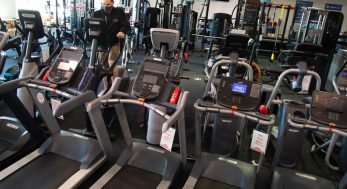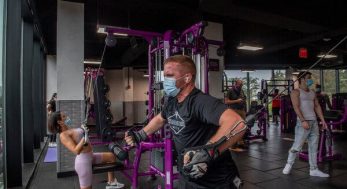
London has become home to many and varied fitness companies
As the New Year begins, the demand for new and exciting fitness classes and activities increases again, particularly in busy cities such as London.
The last decade has seen the fitness industry in London boom, as ideas find their way from free sessions in parks and commons to gym floors and recreation centres.
With the UK, and London particularly, in the midst of its annual January fitness boom, some of the capital’s most intriguing ventures are assessed.
While many ideas come and go from Clapham Common, very few outgrow their origins to become an integral part of what is a very transient community in the heart of London.
Initially started by former care worker Kat Bryson as a fitness group on the Common, the first 12 Rounds session was attended by four people. Since then, it has continued to grow steadily thanks to close attention to the needs of its members. Two of those original four still attend classes at the gym.
The decision to move into a permanent home on St John’s Hill was taken in 2012, and has since become a hub for the local community in Clapham.
At the forefront of Bryson’s vision is the snappy #boxingmakesyoubetter hashtag, but beneath that is a genuine belief in the sport’s healing qualities.
The club have done notable work in raising mental health awareness and Bryson is keen to cultivate a close-knit feel among both members and staff.

From its roots on Clapham Common, 12 Rounds is now a physical gym providing many different classes
She says: “It is all about remembering where we came from and who our community is.
“There have been struggles and challenges, but everyone here knows they are in this together. That will never change.”
What really stands out about 12 Rounds is how close-knit yet all-encompassing it has become. If you turn up in the morning, there will likely be an exercise class attended by mothers. Later in the day there is the recently established lessons for children.
In the evening there is fundamentals for adult beginners and various sessions all the way up to their 12-week fight school, which culminates in charity matches just down the round at the Clapham Grand.
Bryson, recently a parent for the first time, is already planning mother-and-baby classes for her clientele.
Some of these initiatives are still to be found in the exact place they started.
In February 2007, Tom Marien began his first session as One Element on Wandsworth Common.
Now, 13 years on, he is still leading classes at 8am every Saturday and through the week.
To ensure the standards remain high, for his sessions, Marien rotates between around 60 exercise programmes he has personally developed over the past 12 years.
At the heart of each is the commitment to ‘social fitness’ and the ethos of working as a group towards individual goals. As groups of up to 30 push each other through a series of gruelling tasks in near-freezing conditions, that mentality becomes crystal clear.
They have seen competitors come and go from their little patch of grass in south west London, and Marien has learnt enough to know things may change rapidly for him too.
Marien says: “If you can get the members to motivate each other, that is so much better than me doing it.
“I think what makes people return is that it feels like family here.
“We are all in this together and the most important thing for me is that everyone feels like they are coming together and working together.”

One Element provides a unique membership structure for its participants
Such was the initial success that a partnership with the RFU allowed Marien to begin expanding his sessions nationally, only for logistical issues to see the project scaled back.
Now, while staying true to their roots, One Element are cautiously embarking on a franchise model.
There are four more groups across London, in Clapham Common, Richmond, Docklands and Tooting as well as one in Belfast.

One Element is in the process of growing franchise businesses one again
It is not just commercial businesses that have been founded on the grass at Clapham Common.
When Nick Powell and Pete Thom, keen hockey players, realised there wasn’t a club that suited their needs nearby in south London, they took themselves down to the common and set up a casual game.
Before long, more people joined in and it became a weekly occurrence. From there, it was only natural that what was an occasional knock-around became a fully-formed club. Eventually, as the idea grew, players were charged small fees to cover costs and a fully-functioning club was formed.
Now, as the directors of the private limited company, Powell and Thom unlock dividends if they hit growth targets, and Powell, 35, believes this drives a very different mentality to the traditional community-run, grant-funded clubs.

Clapham Common Hockey Club has grown rapidly in recent years
Currently boasting 14 teams and around 400 members, the founders are proud of their flexible membership structure—typical membership starts at £158 a year—and format that sets them apart from the more family-friendly clubs in the south London area.
There are plans for swift growth, with Powell hopeful of reaching the 1000 member mark by the end of 2020.
Of the club as a whole, he says: “Last year we added 220 players and this year our plans was to add 500 but we won’t be able to. We will have to add 250 because of capacity, we will hit it very quickly.
“That is rubbish, because I think we would be the fastest growing hockey club in the world. We want to go faster but we can’t.”

Mixed hockey is a fast-growing section of the club
Specifically, Powell believes their focus on mixed gender teams has been a huge success. So popular have these been that Powell instigated the creation of a league for their three teams. Powell believes Clapham Common Hockey Club to have the fastest-growing mixed teams in the world.
Due to the unique demographics of Clapham and its surrounds, Powell and Thom have devised a system they feels satisfies everyone from those wanting competitive matches to casual players after a social experience – who are now catered for by the newly-formed Social Hockey Club. A recent beginners’ session attracted 75 participants.
Powell says: “We have always put experience at the heart of everything we do here.
“There is a load of people who the traditional model doesn’t work with—no one offers bespoke beginners’ lessons to 20-year-olds, 30-year-olds, 40-year-olds. That is where we come in.
“It is an evolving model and a disruptor model in the way we price it to suit people’s lifestyles better.”

The club are aiming continued growth in members and teams
There are challenges. The club play across sites in Crystal Palace, Battersea Park, Bermondsey and Kennington and have so far been frustrated in their attempts to secure a permanent home—Powell’s preferred outcome for the club.
Discussions with the local council over building a privately-funded site have been in vain, with negotiations for a publicly-funded facility predicted to take many years to come to fruition.
Powell says: “A permanent base would be the ideal situation but it is also a limiting factor.
“If I had a pitch in Clapham it would be amazing, but you have your pitch and 3-4 miles around you and that is it.
“It is a massive downside in one respect, but at the flexible end not being bound to one location opens up new areas and that means expansion possibilities are larger for us.”
Powell believes there is the potential to spread his model beyond London, but is keen to control the capital first.
He adds: “Once we get our model sorted in London, there is plenty of potential to expand. The Social Hockey Club has the potential to really resonate and we want to see where that goes.”

